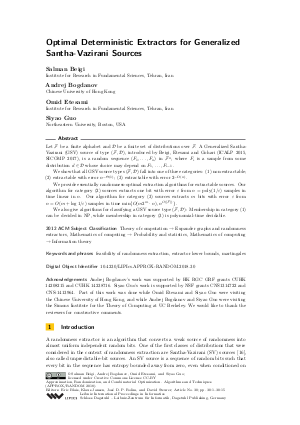Optimal Deterministic Extractors for Generalized Santha-Vazirani Sources
Authors Salman Beigi, Andrej Bogdanov, Omid Etesami, Siyao Guo
-
Part of:
Volume:
Approximation, Randomization, and Combinatorial Optimization. Algorithms and Techniques (APPROX/RANDOM 2018)
Part of: Series: Leibniz International Proceedings in Informatics (LIPIcs)
Part of: Conference: International Conference on Randomization and Computation (RANDOM)
Part of: Conference: International Conference on Approximation Algorithms for Combinatorial Optimization Problems (APPROX) - License:
 Creative Commons Attribution 3.0 Unported license
Creative Commons Attribution 3.0 Unported license
- Publication Date: 2018-08-13
File

PDF
LIPIcs.APPROX-RANDOM.2018.30.pdf
- Filesize: 445 kB
- 15 pages
Document Identifiers
Subject Classification
ACM Subject Classification
- Theory of computation → Expander graphs and randomness extractors
- Mathematics of computing → Probability and statistics
- Mathematics of computing → Information theory
Keywords
- feasibility of randomness extraction
- extractor lower bounds
- martingales
Metrics
- Access Statistics
-
Total Accesses (updated on a weekly basis)
0Document
0Metadata
Abstract
Let F be a finite alphabet and D be a finite set of distributions over F. A Generalized Santha-Vazirani (GSV) source of type (F, D), introduced by Beigi, Etesami and Gohari (ICALP 2015, SICOMP 2017), is a random sequence (F_1, ..., F_n) in F^n, where F_i is a sample from some distribution d in D whose choice may depend on F_1, ..., F_{i-1}.
We show that all GSV source types (F, D) fall into one of three categories: (1) non-extractable; (2) extractable with error n^{-Theta(1)}; (3) extractable with error 2^{-Omega(n)}.
We provide essentially randomness-optimal extraction algorithms for extractable sources. Our algorithm for category (2) sources extracts one bit with error epsilon from n = poly(1/epsilon) samples in time linear in n. Our algorithm for category (3) sources extracts m bits with error epsilon from n = O(m + log 1/epsilon) samples in time min{O(m2^m * n),n^{O(|F|)}}.
We also give algorithms for classifying a GSV source type (F, D): Membership in category (1) can be decided in NP, while membership in category (3) is polynomial-time decidable.
Cite As Get BibTex
Salman Beigi, Andrej Bogdanov, Omid Etesami, and Siyao Guo. Optimal Deterministic Extractors for Generalized Santha-Vazirani Sources. In Approximation, Randomization, and Combinatorial Optimization. Algorithms and Techniques (APPROX/RANDOM 2018). Leibniz International Proceedings in Informatics (LIPIcs), Volume 116, pp. 30:1-30:15, Schloss Dagstuhl – Leibniz-Zentrum für Informatik (2018)
https://doi.org/10.4230/LIPIcs.APPROX-RANDOM.2018.30
BibTex
@InProceedings{beigi_et_al:LIPIcs.APPROX-RANDOM.2018.30,
author = {Beigi, Salman and Bogdanov, Andrej and Etesami, Omid and Guo, Siyao},
title = {{Optimal Deterministic Extractors for Generalized Santha-Vazirani Sources}},
booktitle = {Approximation, Randomization, and Combinatorial Optimization. Algorithms and Techniques (APPROX/RANDOM 2018)},
pages = {30:1--30:15},
series = {Leibniz International Proceedings in Informatics (LIPIcs)},
ISBN = {978-3-95977-085-9},
ISSN = {1868-8969},
year = {2018},
volume = {116},
editor = {Blais, Eric and Jansen, Klaus and D. P. Rolim, Jos\'{e} and Steurer, David},
publisher = {Schloss Dagstuhl -- Leibniz-Zentrum f{\"u}r Informatik},
address = {Dagstuhl, Germany},
URL = {https://drops.dagstuhl.de/entities/document/10.4230/LIPIcs.APPROX-RANDOM.2018.30},
URN = {urn:nbn:de:0030-drops-94349},
doi = {10.4230/LIPIcs.APPROX-RANDOM.2018.30},
annote = {Keywords: feasibility of randomness extraction, extractor lower bounds, martingales}
}
Author Details
References
-
Salman Beigi, Andrej Bogdanov, Omid Etesami, and Siyao Guo. Complete classification of generalized Santha-Vazirani sources. Technical Report TR17-136, Electronic Colloquium on Computational Complexity, 2017.

-
Salman Beigi, Omid Etesami, and Amin Gohari. Deterministic randomness extraction from generalized and distributed santha-vazirani sources. In International Colloquium on Automata, Languages, and Programming, pages 143-154. Springer, 2015.

-
Salman Beigi, Omid Etesami, and Amin Gohari. Deterministic randomness extraction from generalized and distributed santha-vazirani sources. SIAM Journal on Computing, 46(1):1-36, 2017.

-
Iddo Bentov, Ariel Gabizon, and David Zuckerman. Bitcoin beacon. arXiv preprint arXiv:1605.04559, 2016.

-
Jean Bourgain. More on the sum-product phenomenon in prime fields and its applications. International Journal of Number Theory, 1(01):1-32, 2005.

-
Jean Bourgain. On the construction of affine extractors. GAFA Geometric And Functional Analysis, 17(1):33-57, 2007.

- Eshan Chattopadhyay and David Zuckerman. Explicit two-source extractors and resilient functions. In Proceedings of the 48th Annual ACM SIGACT Symposium on Theory of Computing, STOC 2016, Cambridge, MA, USA, June 18-21, 2016, pages 670-683, 2016. URL: http://dx.doi.org/10.1145/2897518.2897528.
-
Benny Chor and Oded Goldreich. Unbiased bits from sources of weak randomness and probabilistic communication complexity. SIAM Journal on Computing, 17(2):230-261, 1988.

- Yevgeniy Dodis, Shien Jin Ong, Manoj Prabhakaran, and Amit Sahai. On the (im)possibility of cryptography with imperfect randomness. In 45th Symposium on Foundations of Computer Science (FOCS 2004), 17-19 October 2004, Rome, Italy, Proceedings, pages 196-205, 2004. URL: http://dx.doi.org/10.1109/FOCS.2004.44.
-
Zeev Dvir. Extractors for varieties. Computational complexity, 21(4):515-572, 2012.

-
Zeev Dvir, Ariel Gabizon, and Avi Wigderson. Extractors and rank extractors for polynomial sources. Computational Complexity, 18(1):1-58, 2009.

-
Ariel Gabizon. Deterministic extractors for affine sources over large fields. In Deterministic Extraction from Weak Random Sources, pages 33-53. Springer, 2011.

-
Saeed Mahloujifar, Dimitrios I Diochnos, and Mohammad Mahmoody. Learning under p-tampering attacks. arXiv preprint arXiv:1711.03707, 2017.

-
Saeed Mahloujifar and Mohammad Mahmoody. Blockwise p-tampering attacks on cryptographic primitives, extractors, and learners. In Theory of Cryptography Conference, pages 245-279. Springer, 2017.

- Jaikumar Radhakrishnan and Amnon Ta-Shma. Bounds for dispersers, extractors, and depth-two superconcentrators. SIAM J. Discrete Math., 13(1):2-24, 2000. URL: http://dx.doi.org/10.1137/S0895480197329508.
- Miklos Santha and Umesh V. Vazirani. Generating quasi-random sequences from semi-random sources. J. Comput. Syst. Sci., 33(1):75-87, 1986. URL: http://dx.doi.org/10.1016/0022-0000(86)90044-9.
-
Salil P Vadhan. Pseudorandomness, volume 56. Now, 2012.

